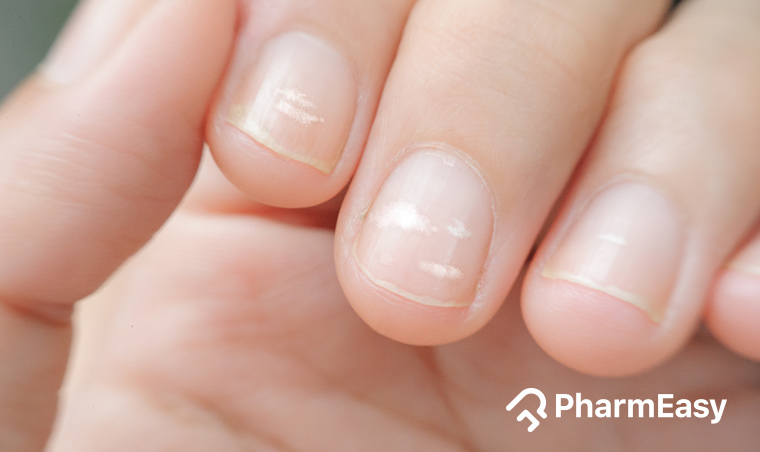Signs You Might Have A Zinc Deficiency
By Dr. Vishesh Bharucha +2 more

Get,

to manage your symptom
Get your,


4 Cr+ families
benefitted

OTP sent to 9988776655



You’ve successfully subscribed to receive
doctor-approved tips on
Whatsapp

Get ready to feel your best.

Hi There,
Download the PharmEasy App now!!


Register to Avail the Offer
Send OTPBy continuing, you agree with our Privacy Policy and Terms and Conditions

Hi There,
Sign up on PharmEasy now!!
Trusted by 4 crore+ families

OTP sent to 9988776655



You have unlocked 25% off on medicines




Code: NU25
By Dr. Vishesh Bharucha +2 more
Table of Contents
Zinc is a mineral required for several bodily processes. It is essential for cellular function, proper growth and development and overall health. Moreover, zinc can help support mucosal barrier integrity and modulate immune responses,and so is said to help the body fight infections1.
Although there are several food items rich in zinc, its deficiency is still common and widespread in India. Studies reveal that overall zinc deficiency was found to be highest in Orissa followed by Uttar Pradesh2. Fortunately, through dietary changes and supplements, it’s possible to reverse zinc deficiency.

In this blog, we will learn all about zinc deficiency, including its symptoms, how it is detected and how it can be treated.
Because your body doesn’t naturally produce zinc, you must obtain it through food or supplements. Zinc is a vital nutrient naturally present in some foods, added to others and also available as a dietary supplement. Zinc is responsible for several bodily functions. Some of the benefits provided by zinc include1,3:
Zinc is responsible for the smooth functioning of various cellular processes, immune systems, supporting physical growth and development, from birth, through adolescence, up to adulthood. During pregnancy, infancy and childhood, daily zinc requirements are said to increase4. Moreover, certain groups of people are more vulnerable to zinc deficiency and should be mindful of their zinc intake. The list includes5,6:
Acrodermatitis enteropathica is a rare autosomal recessive genetic disorder caused by impaired zinc absorption, seen
rashes and diarrhoea, particularly in children7.
Many times, zinc deficiency may not present with any detectable symptoms. However, there are chances that a person with zinc deficiency may experience symptoms such as8,9:
Zinc deficiency can worsen the course of diarrheal illnesses by impairing intestinal mucosal repair and immune defence. Zinc supplementation is shown to reduce duration and severity of acute diarrhoea, especially in children, and is recommended by WHO during diarrheal episodes.
Zinc is important for several vital functions in your body. If you’re a vegetarian, it might be more difficult to meet daily zinc intake, but you can explore supplements. To start boosting zinc intake, consider eating more:
Discuss with your doctor before including any new food item to your routine diet, especially if you have any medical conditions like diabetes.
Your doctor can treat your zinc deficiency right away with zinc supplements. These are available in multivitamins or as zinc gluconate, zinc sulphate or zinc acetate.
It is important to note that that zinc can interact with some antibiotics and high blood pressure medicines (diuretics). Zinc can interfere with the absorption of certain antibiotics, such as tetracyclines (e.g., doxycycline) and fluoroquinolones (e.g., ciprofloxacin), when taken at the same time.
Diuretics like thiazides (e.g., hydrochlorothiazide) can cause increased urinary zinc loss, potentially leading to deficiency with long-term use.
So, talk to your doctor about the right spacing between the dose of zinc-containing supplements and other medicines that you may be taking. This will reduce any chances of interaction between ongoing medicines.
Excess intake of zinc can also be harmful and zinc supplementation should be done under medical supervision. Common therapeutic doses range from 10–40 mg/day, but long-term use of >40 mg/day may cause copper deficiency and other side effects10. Zinc supplements are often prescribed for 2–3 months, depending on severity and underlying cause. The best practice is to take these supplements based on your doctor’s advice.
In most cases, a zinc deficiency is not an emergency, but it can affect the health in several ways. Zinc deficiency in men can be a cause of impotence, while zinc deficiency in pregnant women may affect the development of the baby. Zinc is an important supplement for people fighting chronic illnesses and acute infections. Zinc plays a critical role in managing diarrhoea, especially in children, along with oral rehydration solutions and other medications to reduce the severity of the illness.
Include zinc-rich foods in your diet, watch for any symptoms of zinc deficiency and get it treated at the earliest. Talk to your doctor about zinc supplementation and always take as advised.
Disclaimer: The information provided here is for educational/awareness purposes only and is not intended to be a substitute for medical treatment by a healthcare professional and should not be relied upon to diagnose or treat any medical condition. The reader should consult a registered medical practitioner to determine the appropriateness of the information and before consuming any medication. PharmEasy does not provide any guarantee or warranty (express or implied) regarding the accuracy, adequacy, completeness, legality, reliability or usefulness of the information; and disclaims any liability arising thereof.
Comments

Leave your comment...
You may also like
Comments